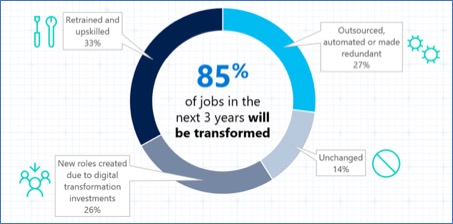Leading platform and productivity company Microsoft has recently partnered with the leading technology advisory firm International Data Corporation (IDC) to assess the digital transformation landscape across the region.
Entitled “Unlocking the Economic Impact of Digital Transformation in Asia Pacific”, the study surveyed 1,560 business and IT leaders from 15 Asia Pacific economies. It showed that 85-percent of jobs in Asia Pacific will be transformed in the next three years. (Please see chart below)

According to the study, the respondents said that over 50-percent of jobs will be redeployed to a new position and/or retrained and up-skilled for digital transformation.
What’s interesting is that the Study shows that 26-percent of jobs will be newly created roles from digital transformation, which will offset the 27-percent of jobs that will he outsourced or automated. In other words, the overall workforce effect will be broadly neutral.
These are clear indications that how businesses organize work, how people find employment and the skills people need to prepare for the workforce are changing dramatically. These changes are likely to accelerate in the decade ahead.
As Artificial Intelligence (AI) continues to transform the nature of work, education, skills, and training will have to transform as well in order to ensure that people are prepared for the jobs of the future and businesses have access to the talent they need to succeed. And as traditional models of employment transform, there will be a need to modernize legal frameworks to recognize new ways of working, provide adequate worker protections, and maintain social safety nets.
BUILDING FOR A BETTER FUTURE
In a recent published by “The Future Computed, Artificial Intelligence and its Role in Society”, the book sited 3 conclusion and impact of AI on work and jobs:

STRAIGHTFORWARD. Artificial Intelligence (AI) will be useful wherever intelligence is needed and it helps us to be more productive in nearly every field of human endeavor, which can lead to economic growth. Put simply, new jobs and economic progress will favor those that embrace the technology, not those that resist it.
PREPARE FOR CHANGE. While Artificial Intelligence (AI) will help improve daily life in many ways and help solve big societal problems, its important to remain critical when examining the issues that it can bring. Beyond AI deployment, what’s equally important is to prepare society and the workforce for the impending changes that AI will catalyze by addressing the need for strong ethical principles, the evolution of laws, the importance of training for new skills, and even labor market reforms. These aspects must all come together in order to make the most of this new technology.
DEMOCRATIZED. To fully realize the benefits of AI, and to minimize the negative outcomes, technology companies, private and public organizations need to come together with a sense of shared responsibility-Artificial Intelligence (AI) must be democratized.
The Artificial Intelligence (AI) building blocks that Microsoft is developing today, such as computer vision, speech, and knowledge recognition, should be made available to all so that they can create their own AI-based solutions. AI should not be controlled by just a few organizations. The Artificial Intelligence (AI) future should be built by everyone with a vision on how AI can benefit economies and societies as well as how we can tackle AI issues and their implications.
The future of Artificial Intelligence (AI) can burn brightly or dimly. Disruption is a norm, and the ability to adapt to disruptions is what defines all of us.

